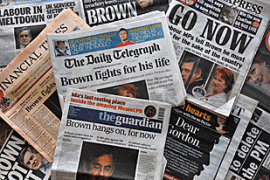Voting begins for EU elections
British and Dutch voters begin polling with minority parties expected to make gains.

Voters’ disenchantment
| In depth | ||
|
|
The anti-European United Kingdom Independence Party was also expected to benefit from voter anger at the economic crisis and recent revelations over politicians’ expenses.
All parties have been hit by the scandal, in which members of parliament have claimed taxpayers money to pay for items ranging from floating duck houses to mortgage repayments.
In the Netherlands, popular anger is expected to benefit the right-wing Freedom Party, led by Geert Wilders who created international controversy over his short film that criticises the Quran as a “fascist book”.
| EU key facts |
|
|
Wilders has won support from Protestant and Catholic voters disenchanted with what’s perceived as the growing influence of the nation’s 800,000 Muslims, many of them immigrants.
Dutch voters are also upset at the ruling coalition of the Christian Democrats and the Labor Party, which are seen as unable to offer rapid solutions to unemployment and bank insolvencies brought about by the global economic crisis.
Radical left and right-wing parties are expected to pick up votes across the continent, with unemployment across Europe rising to 8.6 per cent, the highest level in more than three years.
Turnout fears
But the success of the transnational elections could be tempered by a record low turnout.
Jan Fischer, the Czech prime minister, whose country holds the rotating EU presidency, has called on citizens to cast their votes.
“One cannot complain of the EU being undemocratic and at the same time refuse to go to the polls,” he said on Wednesday.
The 27-nation election, in which 375 million people are eligible to take part, is held over four days, with voting ending on June 7.
The Dutch government will give preliminary results from the vote on Thursday but other countries will wait until Sunday to give the official results.

 There are 27 countries in the EU, with a population of just under 500 million people.
There are 27 countries in the EU, with a population of just under 500 million people.